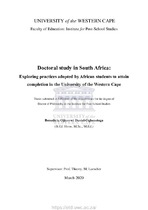| dc.description.abstract | This study explores practices that enable African doctoral students to manage their experiences in order to make progress and eventually complete their doctoral study at the University of the Western Cape in South Africa. The study is informed by previous research into doctoral education, which enumerates barriers to doctoral study completion and students’ completion strategies, as well as by Bourdieu’s theory of practice. It places a focus on students’ academic achievement practices, and how these are informed by students’ dispositions, cultural capital and experiences during their studies. The conceptual-analytical framework developed for the study attempts to bring together existing findings of research into the field of doctoral study and insights from Bourdieu’s theory of practice. It posits that students who seek to attain completion of their doctoral study have agency and resources that they strategically employ within their social and academic environment and, specifically, within the field of doctoral study. It foregrounds doctoral students’ ‘resources’ such as motivation, work ethic, tenacity, and other personal characteristics, and their personal and familial backgrounds, as well as their relevant skills and competences, which all help to shape and inform their learning and completion practices. The study focuses on African doctoral students at the University of the Western Cape. It employs a qualitative design using a case study approach that involves in-depth, semi-structured interviews with students to collect relevant data. The sample consists of 18 African doctoral students from across all faculties of the university. For the purpose of the study, African students are identified as students who self-identify as African, whether they are South African nationals (irrespective of official population group) or students from the African continent (international students). They are purposefully selected to enable the study of a group of students that continues to be under-represented in doctoral studies in South Africa. The analysis of the qualitative data involves narrative analysis and critical interpretation. The study finds that using Bourdieu’s concepts of habitus, cultural capital, and field can help us to establish and better understand the practices that doctoral students employ as strategies to overcome barriers that they encounter during their studies. The study shows that African doctoral students’ completion practices are strongly influenced by specific aspects of their habitus and cultural capital, which are determined as relevant by the field. The study focuses on aspects of habitus such as motivation, level of family education and status, cultural beliefs, values and home language, as relevant sources of academically relevant habitus. It also shows that the socio-economic class, status and occupation of core family members provide a bigger motivation for completion of their doctoral study than cultural capital. In relation to cultural capital in particular, the study thus emphasises matters such as prior academic learning; attitudes, skills and competences learnt in the academic workplace (with particular reference to lecturer-participants of the study); an understanding of the university and of the nature of doctoral study; and learning from the supervisor, other academic and research colleagues, peers and role models. Three attributes of the field of doctoral study are shown to be most relevant to completion: (1) the ‘nature of doctoral study’ and related aspects such as the choice of the research topic, thesis writing, the use of the English language, and writing and presentation of work in progress; (2) the relationship with the supervisor and aspects of the supervision process; and (3) funding. By focusing on the practices of lecturer-participants in particular, the study argues for a model of doctoral study that conceives of doctoral candidates as ‘junior staff members’ rather than merely as students, and thus employs them in a contractual relationship that involves elements of work and study. Finally, it is argued that there is much complexity in the dynamic interaction of the concepts in Bourdieu’s ‘mathematical model’. In particular, it is shown that there are dynamics by which deficiencies in the field and in the resources embodied by participants are being compensated by means of other aspects of the field, cultural capital and habitus and with new learning and adaptation to generate practices that are beneficial to completion. A number of findings also diverge from Bourdieu’s arguments. In particular, the study notes that African doctoral students’ habitus is derived from a wider influence than primarily the nuclear family (especially parents), since sibling influence, the influence of extended family members (especially well-educated ones) and a wider social network are important factors | en_US |

